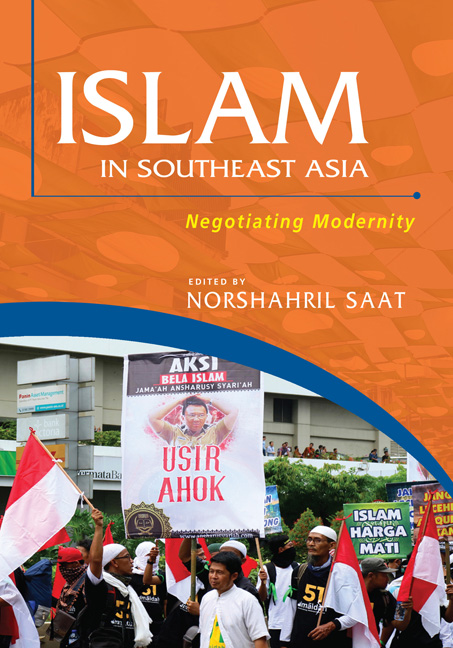Book contents
- Frontmatter
- Contents
- Preface
- About the Contributors
- 1 Introduction
- Section I Malaysia
- Section II Indonesia
- 5 The Middle East Influence on the Contemporary Indonesian “Campus Islam”
- 6 Contemporary Middle Eastern Islamic Thought and its Transmission in Indonesia: A Critical Assessment
- 7 Plural Islam and Contestation of Religious Authority in Indonesia
- 8 Preachers-cum-Trainers: The Promoters of Market Islam in Urban Indonesia
- Section III Singapore
- Index
6 - Contemporary Middle Eastern Islamic Thought and its Transmission in Indonesia: A Critical Assessment
from Section II - Indonesia
Published online by Cambridge University Press: 08 June 2019
- Frontmatter
- Contents
- Preface
- About the Contributors
- 1 Introduction
- Section I Malaysia
- Section II Indonesia
- 5 The Middle East Influence on the Contemporary Indonesian “Campus Islam”
- 6 Contemporary Middle Eastern Islamic Thought and its Transmission in Indonesia: A Critical Assessment
- 7 Plural Islam and Contestation of Religious Authority in Indonesia
- 8 Preachers-cum-Trainers: The Promoters of Market Islam in Urban Indonesia
- Section III Singapore
- Index
Summary
INTRODUCTION
Transmission of ideas from the Middle East to Southeast Asia has been ongoing for centuries through various agencies and mediums. Notably, translations of religious texts and devotional works became important facets of Islamization of the Malay world. Today, such transmission continues beyond the conventional theological, legal and mystical aspects of Islam. Translation works add to the already expansive critical Islamic discourse in Indonesia. Variants of Islamic discourse from the Middle East, including contributions by diaspora Middle Eastern writers living in the Euro-American metropolis, have entered the Indonesian scene via translation and adaptation works. They range from writings of prominent and established ulama (Islamic religious scholars), to revivalist Islamist, reformist, liberal, and leftist-leaning Muslim writers.
This chapter first highlights the historical transmission of Islam into Southeast Asia. Here, the role of religio-cultural transmitters, such as the ulama and missionaries, was vital in translating Arabic works into Indonesian languages and disseminating them. The chapter then examines the significance of these translated Arabic works in Indonesia's Islamic discourse. It then highlights how the dominance of works with fundamentalist bend could give a false impression of their popularity. By contrast, one should also underscore the presence of critical Islamic works—written by leading Muslim liberals and reformists—which have been translated into Bahasa Indonesia from its Arabic sources. These critical works are instrumental in facilitating and enhancing the critical Islamic discourse in Indonesia.
TRANSMISSION OF ISLAMIC KNOWLEDGE IN HISTORY
Transmissions of Islamic knowledge in the past were primarily made possible in two forms: direct transmission by the ulama; and through translations of Arabic works to local languages of classical Islamic texts or kitab kuning (Azyumardi 2004). Islamization was given further boost with the efforts in translating Islamic works originally in Arabic into Malay, Javanese, Sundanese and all other languages in the region (Riddel 2001). Arabic works pertaining to doctrinal creed and law were translated and adapted into the Malay/Javanese language, while the nexus between the local ulama with those in the Middle East, along with local authorities, were instrumental in deepening the process of Islamization in the region (Burhanudin 2012).
- Type
- Chapter
- Information
- Islam in Southeast AsiaNegotiating Modernity, pp. 112 - 139Publisher: ISEAS–Yusof Ishak InstitutePrint publication year: 2018

